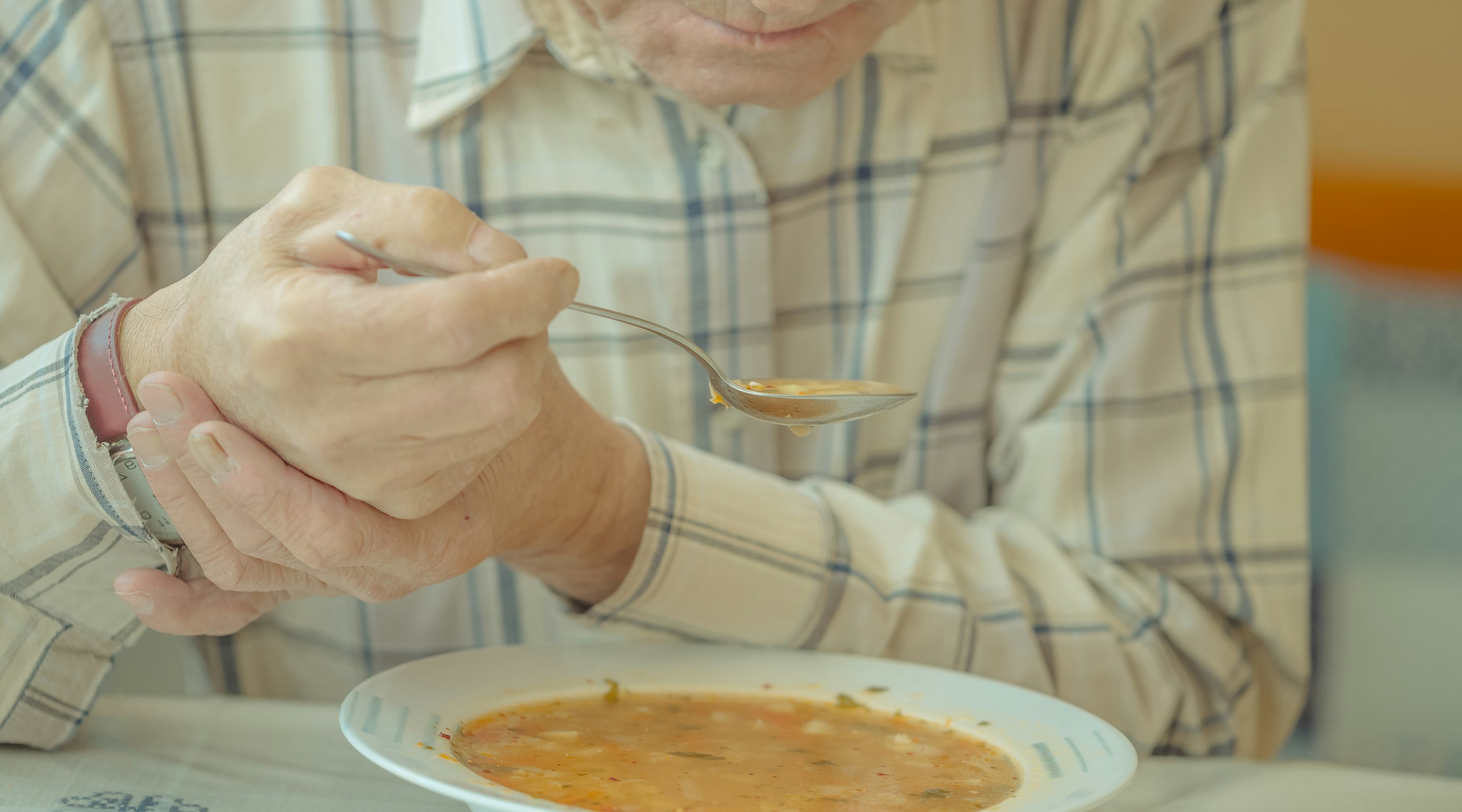How cannabis may help ease Parkinson’s disease
6 min read
Lucy MacKinnon
Every single hour, two people in the UK are diagnosed with Parkinson’s Disease (PD), the world’s fastest growing neurological condition that currently has no cure. With an estimated 8.5 million people facing this incurable diagnosis across the world, increasing numbers of Parkinson’s patients are turning to medicinal cannabis to help potentially manage tremors and rigidity, relieve the symptoms of anxiety that can go hand in hand with the diagnosis, and improve their sleep quality.
In this article we will discuss the positive effects medical cannabis may offer patients with Parkinson’s Disease, analysing its impact on motor symptoms, mental health and neurodegeneration using both ‘real world’ data and clinical evidence.
Contents
The endocannabinoid system and Parkinson’s disease
Scientists are still unsure of exactly why Parkinson’s Disease develops, however they do know that this neurodegenerative disorder is caused by a repeated loss of, or damage to, nerve cells in the brains ‘movement centre’. This gradual brain damage causes patients to experience a variety of symptoms that progressively become more severe over time.
The basal ganglia is the brain region in charge of motor control, and contains nerve cells, or neurons, that are responsible for producing dopamine, an important chemical that regulates movement and mood. When these nerve cells are damaged, the production of dopamine in the brain decreases. This causes patients with Parkinson’s to experience issues with motor-control, displayed in bradykinesia, tremors, and slowness of movement, as well as emotional changes such as anxiety and depression.
Unlike its diminishing effects on dopamine levels, Parkinson’s Disease has been associated with an increased production of a neurotransmitter called GABA, which blocks vital signals and messages from the basal ganglia, affecting movement, rigidity, and coordination. When cannabis compounds like THC and CBD are consumed, they have the potential to influence the body's natural production of chemicals like GABA and dopamine by interacting with the endocannabinoid system.
The endocannabinoid system is a complex system that regulates a number of functions to promote or maintain balance, or homeostasis, within the body. It does this by producing natural cannabinoids, named endocannabinoids, to interact with a complex system of cannabinoid receptors and other neurotransmitters all over the brain and body.
Scientists have discovered two types of cannabinoid receptors, CB1 receptors which are mainly found in the brain and central nervous system and CB2 receptors which are mainly located in the immune system. Due to the proximity of different receptors in the brain, when cannabinoids like THC and CBD are consumed they are also able to influence other neurotransmitters, such as dopamine and GABA, without directly interacting with them.
Research on cannabis for Parkinson’s disease
A common feature of Parkinson’s Disease is an excessive build up of GABA, which hinders the production and abilities of dopamine, as well as serotonin, glutamate, and norepinephrine. However, medical cannabis research shows that certain cannabis cannabinoids (phytocannabinoids) may help regulate the levels of GABA, and so significantly amplify the production of dopamine, resulting in a simultaneous improvement in motor control and mood.
There is unquestionably strong anecdotal evidence to display these impressive effects on patients with Parkinson’s Disease. A simple search on Google will bring up countless videos that demonstrate the visible difference in tremors before and after consuming cannabis posted by patients with Parkinson’s Disease, illustrating the dramatic difference even small doses of medical cannabis may have.
On top of this, there is a growing amount of clinical investigation into the potential efficacy of managing PD symptoms with cannabis-based treatments. For example, an American study in 2016 found 85% of patients felt that cannabis was an effective treatment in symptom management, describing improvement rates as ‘moderate’ or ‘high’.
In a 2004 cross-sectional survey, 46% of patients who consumed medical cannabis alongside their regular medications reported an overall reduction in the severity of their symptoms. Rigidity, tremors, and bradykinesia were all shown to be alleviated in the presence of cannabis, and the researchers in this study concluded there was a correlation between repeated cannabis administration and long-lasting symptom relief.
The effects of cannabis on Parkinson’s disease symptoms
As well as reporting relief from motor symptoms like postural instability, bradykinesia, muscle rigidity, and resting tremors, patients with Parkinson’s Disease have repeatedly noted a reduction in non-motor symptoms with the administration of medical cannabis. Sleep disorders, pain, depression, and anxiety have all shown positive responses to cannabis-based treatments, all of which are symptoms commonly associated with Parkinson's Disease.
A small scale study in 2014 reported PD patients experienced a possible reduction in REM sleep behaviour disorder events when being treated with CBD, whilst a systematic review of 19 different cannabis trials involving patients with fibromyalgia, multiple sclerosis and chronic pain repeatedly displayed potential therapeutic effects on sleep quality using cannabis-based treatments.
Five years later, in Germany, a nationwide survey of patients with Parkinson’s Disease discovered around 44% of patients consuming medical cannabis to manage their symptoms reported reduced levels of pain, and 41% experienced an improvement in muscle cramps.
In 2021, a large-scale survey compared the symptom severity reported by medical cannabis patients with major depressive disorders and generalised anxiety disorder against patients who did not consume cannabis. In comparison to the control group, those consuming medical cannabis reported a significant reduction in symptoms of both anxiety and depression, strengthening the plant's therapeutic potential for PD patients.
Considerations for using cannabis for Parkinson’s disease
Different forms of medical cannabis and their differing methods of consumption influence the effects they can have, and their active half-life within the body, therefore this should be taken into consideration when discussing cannabis treatments. The fastest methods of cannabis absorption involve inhalation or sublingual administration and so, flowers, tinctures, and cannabis oil are often a firm favourite amongst patients seeking rapid relief. Edibles are another convenient and popular form of medical cannabis as they can be easily dosed, extremely discreet, and have long-lasting effects within the body.
As well as form, the strength, and dosage of medical cannabis products can also influence not only the therapeutic effects of the treatment, but also those of other medications in the system. Cannabis has shown to interact with some other conventional medicines, in some cases boosting their efficacy, but in others it can increase the likelihood of unpleasant side effects.
Just like conventional treatment therapies, cannabis does have associated risks and side effects. As well as explaining the benefits' medical cannabis may have for sufferers of PD, The Parkinson’s Foundation explains adverse events like impaired cognition, behavioural changes, blurred vision, and loss of balance have been linked to heavy cannabis consumption. Other research indicates that long term exposure to the psychoactive cannabinoid THC may lead to dopaminergic blunting, reducing the precision of dopamine, which could prove troublesome in patients with Parkinson’s Disease.
Conclusion
While there is still so much to uncover about Parkinson’s Disease, there is also a lot to uncover about its possible interactions with cannabis. This causes limitations in this field of medical cannabis research, and there is a need for further clinical investigation.
As always, we’d recommend having a discussion with your doctor before starting any type of cannabis-based treatment to get professional and individual advice that will help to minimise side effects and the possibility of adverse drug interactions.
If you need an alternative approach to manage your health condition, Releaf is here to help. Our monthly packages are based on your cannabis prescription, and we offer specialist consultations for medical cannabis and a unique medical cannabis card for protection.
Share article
Did you like this article?
It is important to seek medical advice before starting any new treatments. The patient advisors at Releaf are available to provide expert advice and support. Alternatively, click here to book a consultation with one of our specialist doctors.
Elevate your wellness with medical cannabis
Get comprehensive care, convenience, and confidence with an all-in-one treatment plan.
Am I eligible?Authors
With five years of journalism and healthcare content creation under her belt, Lucy strives to improve medical cannabis awareness and access in the UK by producing high quality, credible content.
meet our specialist
Editorial Policy
All of our articles are written by medical cannabis experts, guided by strict sourcing guidelines, and reference peer-reviewed studies and credible academic research. Our expert clinical team and compliance specialists provide valuable insights to ensure accuracy when required. Learn more in our editorial policy.
Need more help?











